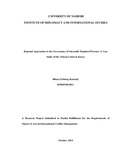| dc.description.abstract | The study analyses regional approaches to the governance of internally displaced
persons as a special category of people who require
unique protection and humanitarian
intervention owing to the fact that they have not crossed borders thus cannot be
effectively governed by international legal regimes
on refugee governance. The study
was inspired by the realization that the African Union has pioneered Internally Displaced
Persons (IDPs) Governance by putting in place a regional convention on protection and
assistance to IDPs out of the realization that the
continent has large numbers of internally
displaced persons who require a structured regional
intervention if their protection is to
be effective.
The study is guided by the principle that countries
individually and collectively
have a responsibility to protect IDPs that is centralized on the universality of human
rights, the theory of legal and moral obligation to
help those who have been
systematically displaced, structurally dispossessed
and functionally abused, regardless of
their position on the globe. The choice of the African Union is largely informed by the
conflict systems theory which underscores how conflicts can be regional and thus unique
in that context and the realization that most internal displacements in Africa are as a
result of the conflicts in the continent.
The study applied both qualitative and quantitative
approaches while using key
informant interviews, focus group discussions and i
t equally gathered data through
individual questionnaires. Identification of respondents was done through a non-
probabilistic sampling of a cross section of stakeholders in the area of IDP governance
including victims themselves, policy makers and humanitarian workers that included
those working for local and international NGOs.
The study set to test the following hypotheses, (i
) H- AU approaches to internal
displacement does not protect IDPs which is the negative hypothesis (ii) H1-African
Union as regional organization is effective in the
protection of IDPS and its governance
which is the positive hypothesis (iii) H2-African Union as a regional organization tries to
protect IDPs but is ineffective which is null hypothesis.
The study findings confirmed both the negative and
null hypothesis, which calls
for the establishment of a legal and structural framework by AU to try and improve IDP
governance among its member states by urging them t
o ratify and domesticate the
African Union convention for the Protection and assistance of Internally Displaced
Persons.
In conclusion, the study acknowledges that regional approaches undertaken
through regional bodies to protect and improve IDP
governance have not been effective
and therefore recommends a number of steps to be ta
ken to realize the same albeit with a
lot of legal and political challenges. That despite
AU pioneering the same, it is only real
commitment by member countries that will realize tangible results in this area. The study
also recommends academic focus to be given to this
area to distinguish it from refugee
governance because mixing the two has been largely
responsible for the invisibility of the
IDPs governance in policy and academic research. | en_US |

